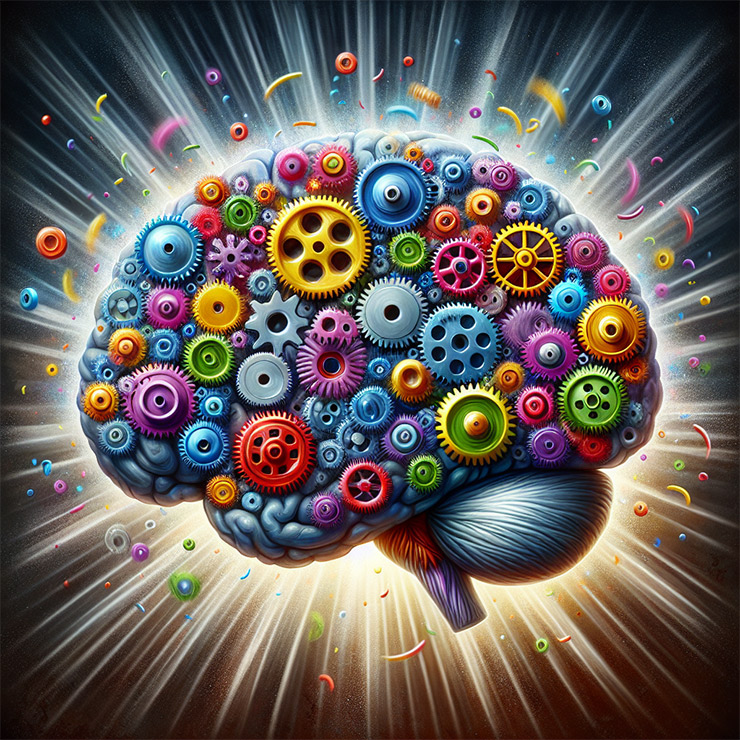-
Table of Contents
Introduction
ADHD, which stands for Attention-Deficit/Hyperactivity Disorder, is a neurodevelopmental disorder that commonly begins in childhood and often persists into adulthood. It is characterized by persistent patterns of inattention, hyperactivity, and impulsivity that can significantly impact an individual’s daily functioning and quality of life. ADHD is a complex condition that can vary in severity and presentation, affecting individuals in different ways. It is important to note that ADHD is a legitimate medical condition and not simply a result of laziness or lack of discipline.
Feeling Stressed or Recognize These Signs?
Talk to a Therapist NowUnderstanding the Causes and Risk Factors of ADHD
Attention-deficit/hyperactivity disorder (ADHD) is a neurodevelopmental disorder that affects both children and adults. It is characterized by symptoms such as inattention, hyperactivity, and impulsivity. While the exact causes of ADHD are not fully understood, researchers have identified several factors that may contribute to its development. Understanding these causes and risk factors is crucial for early detection, diagnosis, and effective management of the disorder.
One of the primary factors believed to contribute to ADHD is genetics. Studies have shown that ADHD tends to run in families, suggesting a strong genetic component. Research has identified specific genes that may be associated with the disorder, although the exact mechanisms by which these genes influence ADHD are still being investigated. It is important to note that having a genetic predisposition does not guarantee the development of ADHD, but it does increase the risk.
Another potential cause of ADHD is brain structure and function. Neuroimaging studies have revealed differences in the brains of individuals with ADHD compared to those without the disorder. These differences primarily involve the frontal cortex, which is responsible for executive functions such as attention, impulse control, and decision-making. It is believed that abnormalities in the development and functioning of this region may contribute to the symptoms observed in individuals with ADHD.
Environmental factors also play a role in the development of ADHD. Prenatal exposure to substances such as tobacco, alcohol, and certain drugs has been linked to an increased risk of ADHD. Maternal smoking during pregnancy, in particular, has been consistently associated with a higher likelihood of ADHD in offspring. Additionally, exposure to environmental toxins, such as lead, has been implicated in the development of ADHD. These environmental factors may interact with genetic predispositions to increase the risk of developing the disorder.
Furthermore, certain prenatal and perinatal factors have been identified as potential risk factors for ADHD. Premature birth, low birth weight, and complications during pregnancy or delivery have all been associated with an increased likelihood of developing ADHD. These factors may disrupt normal brain development and contribute to the manifestation of ADHD symptoms later in life.
Lastly, there is evidence to suggest that psychosocial factors can influence the development and severity of ADHD symptoms. Adverse childhood experiences, such as neglect, abuse, or trauma, have been linked to an increased risk of ADHD. Chronic stress and unstable family environments may also contribute to the development of the disorder. It is important to note that while these factors may exacerbate ADHD symptoms, they are not considered direct causes of the disorder.
In conclusion, ADHD is a complex disorder with multiple causes and risk factors. Genetic predisposition, brain structure and function, environmental factors, prenatal and perinatal factors, and psychosocial factors all contribute to the development and manifestation of ADHD symptoms. Understanding these factors is crucial for early identification, diagnosis, and effective management of the disorder. By recognizing the various causes and risk factors, healthcare professionals can provide appropriate interventions and support to individuals with ADHD, improving their overall quality of life.
Effective Strategies for Managing ADHD Symptoms

ADHD, or Attention Deficit Hyperactivity Disorder, is a neurodevelopmental disorder that affects both children and adults. It is characterized by symptoms such as inattention, hyperactivity, and impulsivity. While there is no cure for ADHD, there are effective strategies that can help manage its symptoms and improve daily functioning.
One of the most important strategies for managing ADHD symptoms is establishing a structured routine. Individuals with ADHD often struggle with organization and time management, so having a consistent daily schedule can provide a sense of stability and predictability. This can be achieved by setting specific times for waking up, eating meals, doing homework, and going to bed. Additionally, using visual aids such as calendars or to-do lists can help individuals with ADHD stay organized and remember important tasks.
Another effective strategy for managing ADHD symptoms is breaking tasks into smaller, more manageable steps. People with ADHD often have difficulty with tasks that require sustained attention and effort. By breaking tasks down into smaller steps, it becomes easier to focus on one thing at a time and avoid feeling overwhelmed. For example, instead of trying to clean an entire room at once, it may be more effective to break the task into smaller tasks such as picking up clothes, organizing books, and dusting surfaces.
In addition to breaking tasks into smaller steps, it is also helpful to set specific goals and deadlines. People with ADHD often struggle with procrastination and may have difficulty prioritizing tasks. By setting clear goals and deadlines, individuals with ADHD can better manage their time and stay on track. It can be helpful to use tools such as timers or alarms to remind oneself of deadlines and keep track of time.
Furthermore, individuals with ADHD can benefit from implementing strategies to improve focus and concentration. This can include creating a distraction-free environment, using noise-canceling headphones, or breaking up study or work sessions into shorter intervals with regular breaks. Additionally, engaging in regular physical exercise has been shown to improve attention and reduce hyperactivity in individuals with ADHD.
Another important aspect of managing ADHD symptoms is developing effective coping strategies. This can include techniques such as deep breathing exercises, mindfulness meditation, or engaging in hobbies or activities that provide a sense of calm and relaxation. It is also important for individuals with ADHD to seek support from friends, family, or support groups who can provide understanding and encouragement.
Finally, medication can be an effective tool in managing ADHD symptoms. Stimulant medications such as methylphenidate or amphetamines are commonly prescribed to help improve attention and reduce hyperactivity. However, medication should always be used in conjunction with other strategies and under the guidance of a healthcare professional.
In conclusion, while there is no cure for ADHD, there are effective strategies that can help manage its symptoms and improve daily functioning. Establishing a structured routine, breaking tasks into smaller steps, setting goals and deadlines, improving focus and concentration, developing coping strategies, and considering medication are all important strategies for managing ADHD symptoms. By implementing these strategies, individuals with ADHD can better navigate their daily lives and achieve success in various aspects of life.
The Impact of ADHD on Academic Performance and Success
ADHD, or Attention Deficit Hyperactivity Disorder, is a neurodevelopmental disorder that affects both children and adults. It is characterized by symptoms such as inattention, hyperactivity, and impulsivity. While ADHD can have a significant impact on various aspects of an individual’s life, one area that is particularly affected is academic performance and success.
Children with ADHD often struggle in school due to difficulties with attention and focus. They may have trouble staying on task, following instructions, and completing assignments. These challenges can lead to poor grades, lower academic achievement, and a sense of frustration and failure. In fact, research has consistently shown that children with ADHD are at a higher risk for academic underachievement compared to their peers without the disorder.
One of the main reasons why ADHD has such a profound impact on academic performance is because it affects the executive functions of the brain. Executive functions are a set of cognitive processes that help individuals plan, organize, prioritize, and regulate their behavior. These functions are crucial for academic success as they enable students to manage their time effectively, stay organized, and complete tasks in a timely manner.
In addition to executive function deficits, individuals with ADHD often struggle with working memory. Working memory is the ability to hold and manipulate information in one’s mind over short periods of time. It is essential for tasks such as following multi-step instructions, solving complex problems, and remembering information from one moment to the next. When working memory is impaired, it becomes difficult for students with ADHD to retain and apply information, which can hinder their ability to learn and perform well academically.
Furthermore, the symptoms of ADHD can also impact social interactions and relationships within the school environment. Children with ADHD may have difficulty sitting still, waiting their turn, or engaging in cooperative play. These challenges can lead to social isolation, peer rejection, and feelings of low self-esteem. As a result, students with ADHD may be less motivated to participate in classroom activities, ask questions, or seek help when needed, further hindering their academic progress.
Fortunately, there are strategies and interventions that can help mitigate the impact of ADHD on academic performance. One of the most effective approaches is the use of medication, such as stimulant medications like Ritalin or Adderall. These medications can help improve attention, focus, and impulse control, allowing students to better engage in their schoolwork. However, medication alone is not enough. It is important to combine medication with behavioral interventions, such as implementing structure and routines, providing clear instructions, and breaking tasks into smaller, manageable steps.
Additionally, accommodations and support within the school setting can make a significant difference for students with ADHD. These may include preferential seating, extended time on tests and assignments, and access to assistive technology. Moreover, providing a supportive and understanding environment, where students feel accepted and valued, can help boost their self-esteem and motivation to succeed academically.
In conclusion, ADHD can have a profound impact on academic performance and success. The executive function deficits, working memory impairments, and social challenges associated with ADHD can make it difficult for students to stay focused, organized, and engaged in their schoolwork. However, with the right interventions and support, individuals with ADHD can overcome these obstacles and thrive academically. By implementing strategies such as medication, behavioral interventions, and accommodations within the school setting, we can help students with ADHD reach their full potential and achieve academic success.
Conclusion
In conclusion, ADHD (Attention-Deficit/Hyperactivity Disorder) is a neurodevelopmental disorder characterized by persistent patterns of inattention, hyperactivity, and impulsivity. It affects both children and adults, and can have significant impacts on various aspects of life, including academic performance, social relationships, and overall functioning. While the exact causes of ADHD are not fully understood, it is believed to be influenced by a combination of genetic, environmental, and neurological factors. Treatment options for ADHD typically involve a combination of medication, behavioral therapy, and support from healthcare professionals and educators. With appropriate management and support, individuals with ADHD can lead fulfilling and successful lives.

